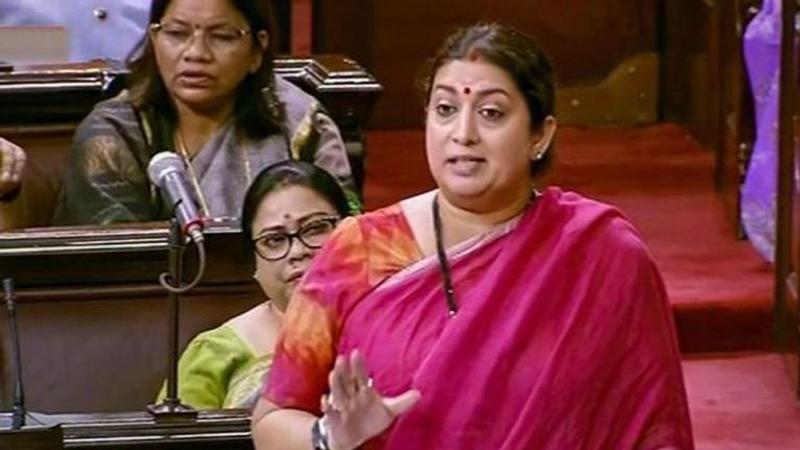Published 20:41 IST, July 24th 2019
Rajya Sabha passes POCSO amendment bill, including death penalty for aggravated sexual assault on children
The Rajya Sabha on Wednesday passed a bill entailing amendments to the POCSO Act by including the death penalty for aggravated sexual assault on children, besides providing stringent punishments for other crimes against minors.

The Rajya Sabha on Wednesday passed a bill entailing amendments to the POCSO Act by including the death penalty for aggravated sexual assault on children, besides providing stringent punishments for other crimes against minors.
The bill would now be sent to the Lok Sabha for approval. The Protection of Children from Sexual Offences (Amendment) Bill, 2019 also provides for fines and imprisonment to curb child pornography.
While replying to the debate, Union Women and Child Development Minister Smriti Irani said the government is setting up 1,023 fast track courts, which would specially deal withe POCSO related cases.
"Recognising that justice delayed is justice denied, the government has sanctioned 1023 fast track courts, particularly to be made for dispensing cases which were pending under POCSO, she added.
The minister also spoke on the growing number of such cases and lauded the support from members cutting across party lines.
"What we touch today is just a tip of the iceberg as many cases are swept under the carpets," she said while referring to the AITC member Derek O' Brien comments that "many cases are not spoken about as the perpetrator happens to be known to the victim and happens to be a part of the victim's family."
During the debate on the bill in the upper house, Brien had recalled his childhood trauma of being molested in a bus.
The government also took note of pending cases in various high courts and said that 1.66 lakh cases relating to sexual assaults were pending across the country at several stages.
"The government reached out to each state and 18 states have consented to set up this court," said Irani.
"We have ensured that an expenditure of Rs 767 crore of which the government of India support would be Rs 474 crore is now given so that these fast track courts are established within the limited time frame of 2019-2021," Irani said adding that it reflects the priority of the government.
Besides, the government would also supervise the process and have a meeting with the Registrar General of every high court to supervise the progress made in setting up such courts.
"We are also going to ensure that from every quarter from the Registrar General of every high court, we look at the progress made including the utilisation of funds and these report would be shared with the Ministry of Law & Justice, MHA and Ministry of Women and Child Development," she said.
Irani further added:" To ensure that what is the quality of justice that was dispensed, an evaluation would be done through an institution empanelled by Niti Aayog with regards to this process, which the government is about to undertake."
The ministry officials also had a meeting with the Registrar General of Supreme Court, after the apex court had taken cognisance over delay in child offence related cases, to speed up the justice and strengthen the mechanism.
The monitoring and implementation of this act happens through National Commission for Protection of Child Rights (NCPCR) and the state governments have been asked to appoint a senior nodal police officer for their state level Commission for Protection of Child Rights.
"Now this same has been complied by all state governments," Irani said adding the data of victims is also being refined as per their genders to give better support and rehabilitation process.
Besides, the government would also monitor the pendency of such cases at local police level at the investigation level as it has to be completed within a time frame.
A National database of sexual offenders has also been launched by MHA last year and contains data of 6.20 lakh sexual offenders in the country. The data helps when such person goes for employment and the institution sends their information for police verification.
The government is also training the officials in forensic science for investigation in such sexual assault cases.
When a member sought to know the description of penetrative sexual assault, the minister while apologising for "being a bit crude" said in some cases objects have been inserted in children.
Over the death penalty, she said that it was just an option given under the amendments to the bill.
"The punishment now goes to 20 years until the entire life and death as deemed fit by the court, given that the court wisely uses these kinds of descriptive punishments," Irani said adding "We can rely on the wisdom of the courts to use the death penalty in rare of the rarest case."
Over the specific timeline, she said that the entire trial has to be completed within one year and investigation has to be completed within two months from the filing of FIR.
The bill was introduced in the Rajya Sabha on Tuesday by Irani.
While participating in the debate Vandan Chavan of NCP said that there is a need for child-friendly courts and the identity of the victim should not be revealed.
Rajaram of BSP said that the law needs a stricter implementation and said that mastermind of the crime should also be equally punished along with the main offenders.
Shushil Kr Gupta of AAP, Vijaysai Reddy YSRCP, Binoy Viswam of CPI and Chaya Verma of INC also spoke on the issue.
Updated 20:52 IST, July 24th 2019




